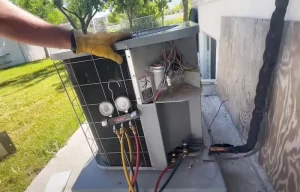With time, HVAC systems in older homes wear out and loose efficiency. Upgrading the HVAC system in an older home can greatly improve indoor comfort and energy efficiency. But there are several factors to consider before upgrading the heating and cooling system.
These factors include compatibility, proper installation, correct sizing, and many more. All of these factors help house owners to make proper decisions about HVAC upgrades.
For HVAC upgrades and AC repair, Allen, Texas has some of the best in the business for you. In this guide, we will let you into the details of these factors and their importance.
Table of Contents
10 Factors To Consider For HVAC Upgrades
Check out the essential factors that all homeowners must think about before upgrading.
1. Energy Efficiency:
Older HVAC systems lose their energy efficiency over time due to usage, wear or tear, and so on. The loss in efficiency results in the system consuming more electricity, which in turn increases the high energy bills.
Upgrading the old systems to newer models with a higher Seasonal Energy Efficiency Ratio (SEER) rating can reduce energy consumption. This will help homeowners to save on monthly bills. On top of that, it will help you to protect the environment as these systems are eco-friendly.
2. Compatibility:
The outdated HVAC systems are connected to the vents, ducts, and electrical systems of the home. When upgrading the system, it is necessary to check compatibility. Make sure that the new HVAC equipment is compatible with the ducts, vents, and so on present in the home.
Several contractors from the maintenance and emergency AC repair company in Allen, TX, conduct inspections of the existing system. These inspections help to ensure whether you need any urgent modifications before installing the new unit or not.
3. Proper Sizing:
One of the most important factors that homeowners must take into account is the size of the HVAC system. It plays a major role in ensuring maximum efficiency and comfort inside the home. Choosing the perfect size will help the home maintain a comforting temperature throughout the year.
HVAC units that are too small compared to the home will struggle to heat and cool the entire home. On the other end, units that are too large will consume more electricity than usual and still not effectively control the temperature.
4. Indoor Air Quality:

HVAC upgrades in older homes come with an opportunity to improve indoor air quality. Air quality can be improved through HEPA filters, UV lamps, air cleaners, and many more.
Consider adding efficient air filtration and purification systems to make the indoor air safe for yourself and your loved ones. These purification systems help to remove contaminations, pollutants, and so on from the air.
5. Maintenance:
Servicing an HVAC system is one of the most important factors that you have to take into consideration. This is because regular maintenance is key to the longevity and efficiency of heating and cooling units. HVAC maintenance includes a wide range of factors, such as duct cleaning, insulation, filter replacement, and many more.
An air conditioner or heating system requires servicing at least once or twice a year. Make sure to include a proper maintenance plan in the upgrade to ensure that the system is regularly cleaned, inspected, and adjusted.
6. Professional Installation:
Installing an air conditioner or heating system properly is essential for proper installation and efficiency. Hiring a professional HVAC specialist to install the upgraded or new equipment is a must. The reason behind this is that an experienced contractor has the proper knowledge and expertise to ensure that the new system operates safely and effectively. And this expertise will help in providing maximum comfort and energy savings.
7. Ductwork:
Another factor that you must take into account during upgrading is the ductwork. Inspecting and repairing or replacing leaks and damage in the ducts can improve the overall efficiency of the HVAC system. Leaks in the system allow the cooled or heated air to escape from the home, resulting in inefficient temperature regulation.
However, sealing the ducts properly and repairing leaks can help prevent the loss of conditioned air. Not only that, but it can help to decrease the cost of energy and improve comfort significantly.
8. Zoning:
Zoning HVAC system helps to provide separate temperature control for different areas of the home. The purpose of zoning is to allow greater comfort and energy savings inside the house. With zoning, homeowners have the ability to set each room or section to a different temperature. This helps to reduce the energy required to heat or cool unoccupied areas of the property.
9. Cost
Another important factor that you must consider before an HVAC upgrade is the cost. Upgrading the entire system will cost a significant amount of money. However, this cost is dependent on brand, size, efficiency rating, and so on. Typically, the price of replacing the old system with a new one varies from $2500 to $10000 or more.
10. Thermostat:
Last but not least, homeowners must consider the thermostat when upgrading their HVAC. The work of a thermostat is to help regulate the temperature inside the home more efficiently. Nowadays, thermostats are equipped with the latest technology to ensure better control of the HVAC units and efficiently regulate the temperature. Install a smart thermostat when upgrading the old HVAC system of your home.
Final Words
Upgrading the HVAC system of an older home is a great investment. This investment helps to save energy and improve comfort while reducing the cost of electricity bills. Not only that, these upgrades contribute to the welfare of the environment as well.
If you want to upgrade your old HVAC system, make sure to work with a professional for the best installation and inspection. For the best service, AC repair, Allen, Texas, has some of the most expert technicians in the field.

